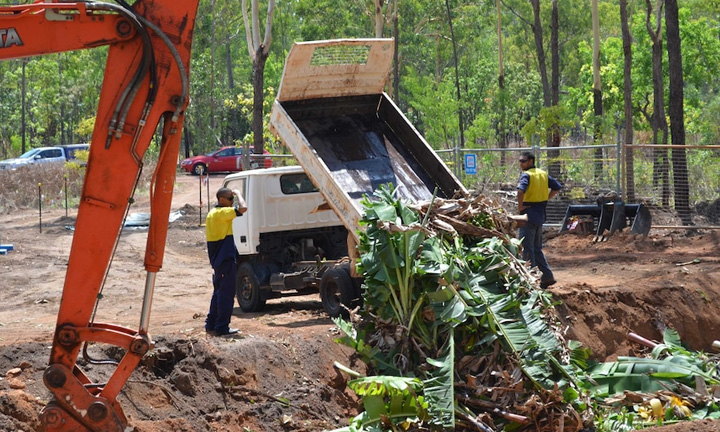SOURCE: Alicia Perera, ABC.net
Since first being detected in May, banana freckle has spread to more than 40 properties across the Northern Territory’s Top End region.
One of those is Julie-Ann Murphy and Alan Petersen’s farm, Rum Jungle Organics.
The only commercial farm caught up in the outbreak, they’re now facing the prospect of losing their entire banana plantation for the second time in a decade, as the NT government takes steps to tackle the disease.
“It’s pretty devastating to do it a second time,” Ms Murphy said.
“It was hard enough to understand the first time, but you just can’t believe it’s happened a second time.
“We’ve lost time, we’ve lost productivity, we’ve lost income, we’ve lost customers, and we have to almost start again.”
On Monday, the NT government released a response plan to tackle the Top End’s banana freckle outbreak.
Under the plan, all banana plants and plant material on properties where banana freckle has been detected will be removed.
Properties free of the disease will not have any plants removed, and the government will continue surveillance to determine how far the disease could have spread.
“What we’re trying to do is [to] protect as many of the plants as we possibly can, in the properties that aren’t affected from banana freckle,” NT chief plant health officer Anne Walters said.
“The decision was really around, how do we get rid of banana freckle [with] the least possible impact on our community and on our growers.
“What we want to do is have a great outcome for industry, which is to eradicate banana freckle, but at the least cost to our community.”
The detection of banana freckle – a fungal disease – at a residential property in Batchelor this year marked its first appearance in Australia in several years in Australia, after it was thought to have been eradicated in 2019.
Since then it has since spread to 42 properties in the Top End, mainly in the areas of Batchelor and Rum Jungle.
Plan ‘strikes a good balance’: Farmers
In 2013, when Australia experienced its first banana freckle outbreak, banana plants at almost every property, not just infected properties, were removed.
The response decimated the territory’s commercial banana industry, to the point where supermarkets became reliant on importing the fruit from interstate.
NT Farmers chief executive Paul Burke welcomed the government’s new response plan for taking a more balanced approach.
“It strikes a really good balance between what’s achievable and what’s realistic for growers,” he said.
“We were very focused on not eradicating all bananas across the Northern Territory, but focusing on the areas where banana freckle is prevalent.”
Compensation available
The new response plan also makes compensation available for affected properties, Dr Walters said.
She said the government was already in talks with a commercial property caught up in the outbreak – believed to be Rum Jungle Organics – about “owner reimbursement costs”.
Ms Murphy, whose business has been unable to earn income in the six months it’s been under quarantine, confirmed the government had been in touch with her and her husband to arrange compensation for their lost income.
But she said they wished action had been taken sooner.
“No question, they’ve bumbled along for too long, and it needed to be acted on much more quickly than it was,” she said.
Dr Walters said the government was still working to determine how the disease had re-entered and spread in the Top End, years after it was believed to have been eradicated.
She said at the moment biosecurity staff were exploring “a few possibilities”, including whether it spread by wind and rain, by animals, or by transport on people’s clothing or shoes.
Ms Murphy said as severe as the new action plan would be for her and her husband’s business, she was hopeful it would give authorities a better chance of eradicating the disease for good in future.
“I think targeting [the disease] over time makes more sense,” she said.
“So if they take out any [plants] that are infected now, and they keep surveying and take them out as they go, they’re more likely to keep a grip on it, rather than just wiping everything out.”

